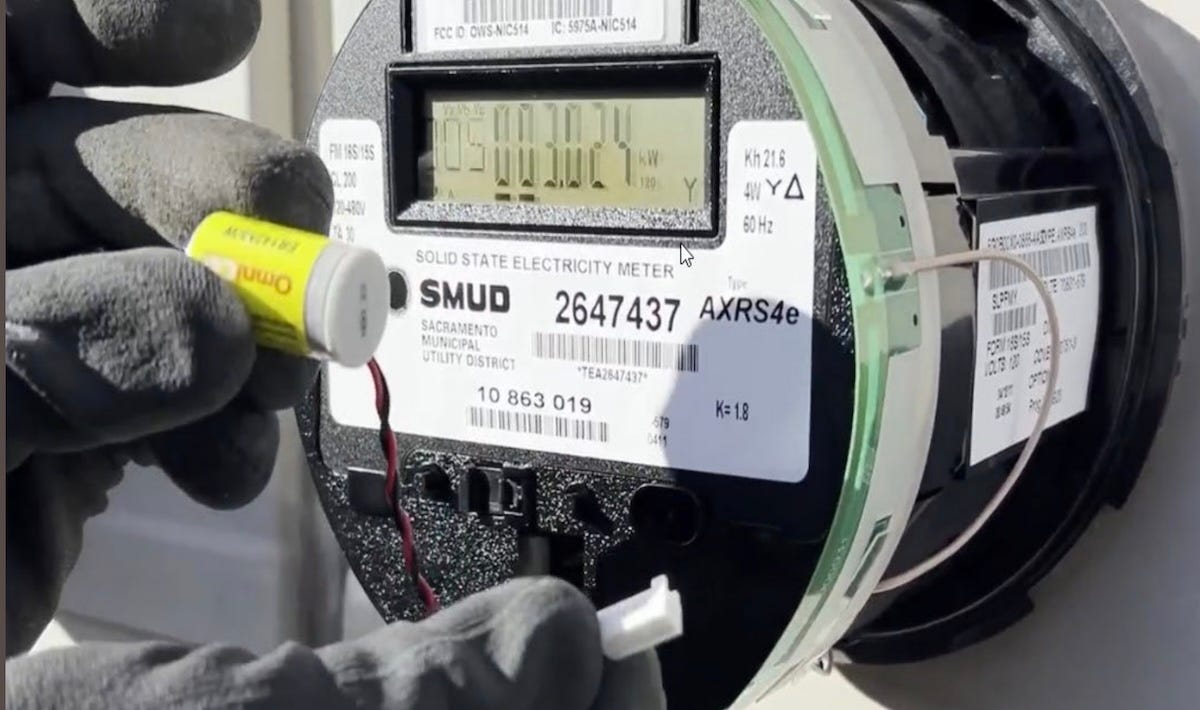First they came for the pot growers...
Minority Report was supposed to be Hollywood fantasy. Behold! The pre-crime power grid is now reality and your bill is probable cause.
A California utility company is under fire for handing over customer energy data to police — with no warrant and a side of racial profiling for good measure. You may not grow weed, but if your “usage” looks wrong, expect to be next. Think your solar panels and sourdough starter will exempt you from the dragnet? Think again.
The Electronic Frontier Foundation (EFF) filed a lawsuit in 2022 against the Sacramento Municipal Utility District (SMUD), accusing it of handing over energy usage data to the police without warrants — and specifically targeting homes with Asian surnames as suspected illegal cannabis grow operations.
[That’s right — SMUD! Because if dystopia is going to be rolled out right on schedule, it might as well be by an agency named like a second-rate Bond villain.]
The case is now moving through the California court system, with a hearing date set for October 10, 2025. EFF is arguing that your electricity bill is being used as a law enforcement tool. The complaint alleges that the utility company proactively feeds data directly to the police — no subpoenas, no probable cause, just a lot of "abnormally high" usage and algorithmic suspicion. Add in a little racial profiling, and voilà: you’ve got a stealth surveillance program dressed up as cannabis curtailment efforts.
According to the filing:
Between 2009 and 2014, SMUD rolled out advanced metering infrastructure, including wirelessly connected “smart meters” installed for 99.9% of its customers. Unlike their analog predecessors, smart meters scoop up energy usage data continuously, in 15-minute increments, and transmit this data to SMUD wirelessly every few hours. SMUD uses the “interval data” from the smart meters to discern what might be happening inside its customers’ homes. This interval data can reveal a wealth of private information, including when customers are sleeping or awake or demographic information such as employment status or family size. SMUD analysts can, in effect, use the data to digitally peer into a person’s home.
SMUD uses sophisticated software to analyze smart meter data. The software’s initial purpose was to help SMUD find power theft. But for the last decade, SMUD analysts have actively collaborated with law enforcement—and especially the Sacramento Police Department—by providing lists, opinions, and tips in a hunt for SMUD customers who might be growing cannabis. Specifically, law enforcement sends requests for, and SMUD discloses, lists of all customers in a given zip code that use above a minimum threshold of electricity. Often, these requests span the zip codes for an entire city. One such list included more than 10,000 customers. SMUD analysts then scrutinize the smart meter interval data, going “account by account” in a “painstaking” process, and opine if a customer is a “pattern” user, or speculate about the number of lights a customer might be using to grow cannabis. The Sacramento Police Department requests this data quarterly.
Like so many technologies we’ve been persuaded to adopt, smart meters were marketed as part of the move to a low-carbon future, offering energy efficiency and consumer control. But it turns out they also happen to be the perfect spy tool. They know when you wake up, when you turn on the heat, and how long you boil your tea kettle. And increasingly, that data isn't just staying with your utility company. It's being shared, sold, analyzed, and yes — weaponized.
While participation is voluntary, the suit explains that nearly all of SMUD’s 650,000 customers are using smart meters. “SMUD incentivizes smart meter adoption by adding opt-out fees: a one-time fee of $145 and a monthly fee of $14. Some customers in multi-family homes or apartments cannot opt out.”
(Can we just highlight this once more. If you want privacy, you have to pay for it: $145 initially, then $14 per month. Lunacy!)
The lawsuits against SMUD and the Sacramento Police Department allege violations of California’s constitutional right to privacy. But the broader problem isn’t just legal — it’s cultural. It’s the normalization of precrime logic: the idea that people can be flagged and investigated not for what they’ve done, but for what their behavioral data suggests they might do at some point.
Maybe you think this is all benign and you have nothing to hide. Maybe you’re glad the public utility is helping cops catch the bad guys. But think about this: analysts can use the data from smart meters to infer when someone in a household is showering, as electric water heaters consume significant amounts of power. This data also allows “inferences on customer demographics,” including employment status, family size, and even religion and income.
Take this to its logical conclusion. When water becomes scarce and showers are rationed, will you get a knock on the door from law enforcement if you’re taking an unauthorized shower? Do you want your power company snitching on you?
Remember: you’re not doing anything wrong… until you are. That’s how tyranical systems work. Just because you’re not growing illegal weed in your basement doesn’t mean you’re safe. When authorities can weaponize energy data to target a specific groups under the guise of "public safety," we’re well past the slippery slope.
Again, from the lawsuit:
In May 2020, two Sacramento Sheriff’s deputies showed up unannounced at the home of Petitioner Alfonso Nguyen. They demanded entry to conduct a search, accused him of growing marijuana, and said SMUD had reported that he used a lot of electricity. They were there because SMUD reported his home’s electrical usage to the Sheriff’s office. When Nguyen denied growing marijuana, and refused a search, a deputy called him a liar.
Nguyen has never grown marijuana, and neither has anyone he lives with. Rather, he consumes more than average electricity due to a spinal injury. He uses an electric wheelchair and must maintain his body temperature with the steady use of electric heat pumps and air conditioning. As a result of the encounter, Nguyen feared for his physical safety and felt that his privacy had been invaded.
Similarly, in 2020, at about 7:00 am, Sacramento Sheriff’s deputies showed up at declarant Brian Decker’s home with a warrant. They were there because his name and home appeared on a SMUD list, and because SMUD told law enforcement that “4 to 5 grow lights are being used [at his home] from 7pm to 7am.”
With guns drawn and sirens and bullhorns blaring, they demanded that Decker come outside. Frightened, and with neighbors video recording the event, Decker was forced to walk backward out of his home in only his underwear. When deputies found no cannabis growing operation, they asked why he was using so much power. He was mining cryptocurrency. Indeed, the surveillance program has led law enforcement to multiple homes mining cryptocurrency.
So to recap: We’ve got a man with a spinal injury, a guy mining crypto, a utility company named SMUD, and cops showing up with guns drawn — all because someone’s power usage looked ‘weird.’
This isn’t about public safety or sustainability. It’s about conditioning people to accept the digital panopticon, in which their behavior — their energy consumption, water usage, even when they sleep — can and should be monitored, analyzed, and enforced by systems that answer to no one. All under the banner of “green tech” and the “public good.”
If your usage doesn’t match the model, the model wins.
This is how the social credit system starts. A quietly humming, all-seeing, efficient “smart” meter — and a knock on the door from someone who insists they're just following the data.
Welcome to the future. It runs on electricity. And suspicion.
What can you do about it? Opt out. Do not comply! You may balk at $14 per month, but that’s what your life might be worth should the “good guys” decide you’re a bad guy. Don’t say we didn’t warn you.




The creeping infringements on privacy, autonomy, freedom of speech, and the digital surveillance network are certainly progressing rapidly. It seems to be accelerating and I don't see how it can be stopped unless there's a massive return to a simpler less technological way of life. It doesn't seem likely that people will give up all the conveniences, and benefits of the techno society we live in.
But the problem isn't the technology so much, it's more the way it's used and the corrupt systems that allow it to be misused. There aren't a lot of safeguards in place yet to stop the most powerful tools ever created to be controlled and weaponized by the ruthless and wealthy elites.
Somehow we have to find a solution that doesn't crush the human spirit, and doesn't lead to a dead end dystopian future.
There might come a day when we have to decide to give up the illusions and promises of the technocrats, and make them accountable, even if it causes a world of pain.
I couldn't help but wonder, won't the powers that be, consider anyone opting out as suspicious? I don't think that opting out will be a protection. More like a red flag to the overlords.